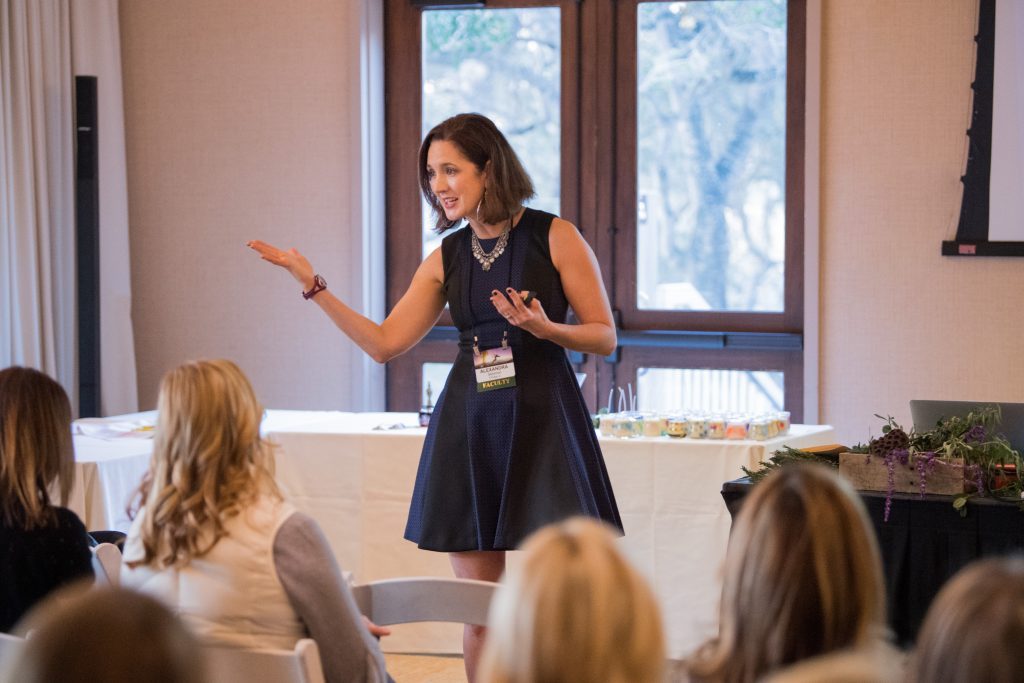
The Honorable Professor Doctor Alexandra Solomon
To listen to this episode, click the saucy redhead on the peach background, and become a patron of the horizontal arts…
Lila: I wish for us all to do that with our assumptions, constrictions, judgments, and ideas— about relationships: Is this mine? Or is this somebody else’s? […]
Alexandra: I mean, some of it’s about, needing to belong, right, […] fear of being rejected if I’m not who you need me to be or want me to be… but then some of it’s also driven so much by love and oftentimes I see this with my students who are either first-generation college students, or first-generation American, […] where they carry their parent’s story of struggle, like really authentically carry—
Lila: On them as a backpack, basically.
Alexandra: Yeah! In a beautiful sense of like, I’m here because of what my parents did. I have these opportunities my parents didn’t have. And where it really is a desire to bring full circle their parents story of struggle, and, and also needing to write— sort of like let, let some of it go, like finding that line between burden and honor.
This week’s episode is part two of my capaciously compassionate conversation with Dr. Alexandra Solomon: clinical psychologist, university professor, author of Loving Bravely, and creator of the internationally-renowned undergrad course “Marriage 101.” Her forthcoming book: Taking Sexy Back: How to Own Your Sexuality and Create the Relationship You Want will be released in February 2020.
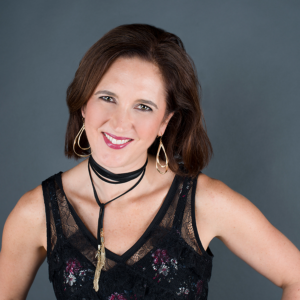
Hello Alexandra!
Alexandra just celebrated her 21st wedding anniversary with her husband Todd, and wrote a list of 21 marriage musings to commemorate. (I hear that Todd wrote his own list as well, which will soon be shared with her mailing list!)
I’m always grateful to receive her musings, whether by email in essay form, or in quote form on social media. Her Instagram profile is a daily dose of tender wisdom. Find her at dralexandrasolomon.com and Dr.Alexandra.Solomon on Instagram.
In episode 91. loving bravely, we talked about weddingburn, a microdose & my little secret, compersion, sexual boredom, & novelty drive, choosing nonmonogamy out of fear, the gendering of purpose, how college-age Alexandra met her husband and had to recalibrate her ideas of masculinity.
We talked about what lies at the intersection of your skills, your passion, and your pain, which is the question I encouraged Patrick to ask himself, in order to seek out his purpose.
Alexandra taught me about the attachment styles: secure, anxious, avoidant, & disordered.
We talked about neediness, turn-off, and uncertainty, the difference between separation and shame, and her definition of loving bravely.
Alexandra shared how she had decided she could only be the smart girl, not the pretty one. And how today in her adult life, she holds space for study and scholarship and love and sex to coexist.
In this episode, we discuss:
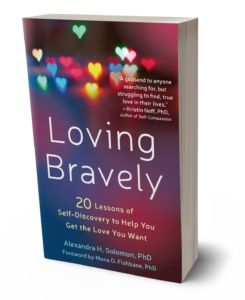
* defining one’s own marriage
* how a couple’s sexuality is made up of three entities: my sexuality, your sexuality, and the couple sexuality
* navigating uneven libidos
* the ongoing reconciliation of being a smart woman, and also, a sexy one
* how I’ve used my sexuality to ensnare, charm, and bewitch— because I thought I had to
* the faculty Greek chorus of judges in Alexandra’s head
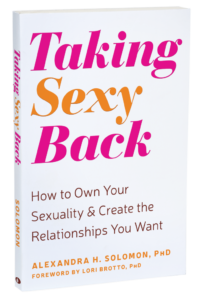
* her new book, Taking Sexy Back: a quiet, compassionate, feminine journey into self, in which she makes “sexy” a noun
* mirror-work
* looking for what is right about your body
* dancing yourself into eroticism
* the time I got to be a sex doll (It was fun.)
* making your monogamy explicit
* what keeps her college students from defining their relationships
* her Marriage 101 class
* dialectical intelligence
* holding the simultaneous truths that I am both rebellious about relationships, and long to dance with my father at my wedding
And finally, Alexandra tells me a remarkable story, about her father’s death, and what happened because he gave his body to science.
Each horizontal conversation is between two and five hours long, and divided into two parts (except for the 5 hour-long one, which was divided into 4). Part one, like 91. loving bravely, is available in all the podcast places, and part two is available exclusively to patrons of the horizontal arts. Patreon is like the love child of crowdfunding and a subscription service.
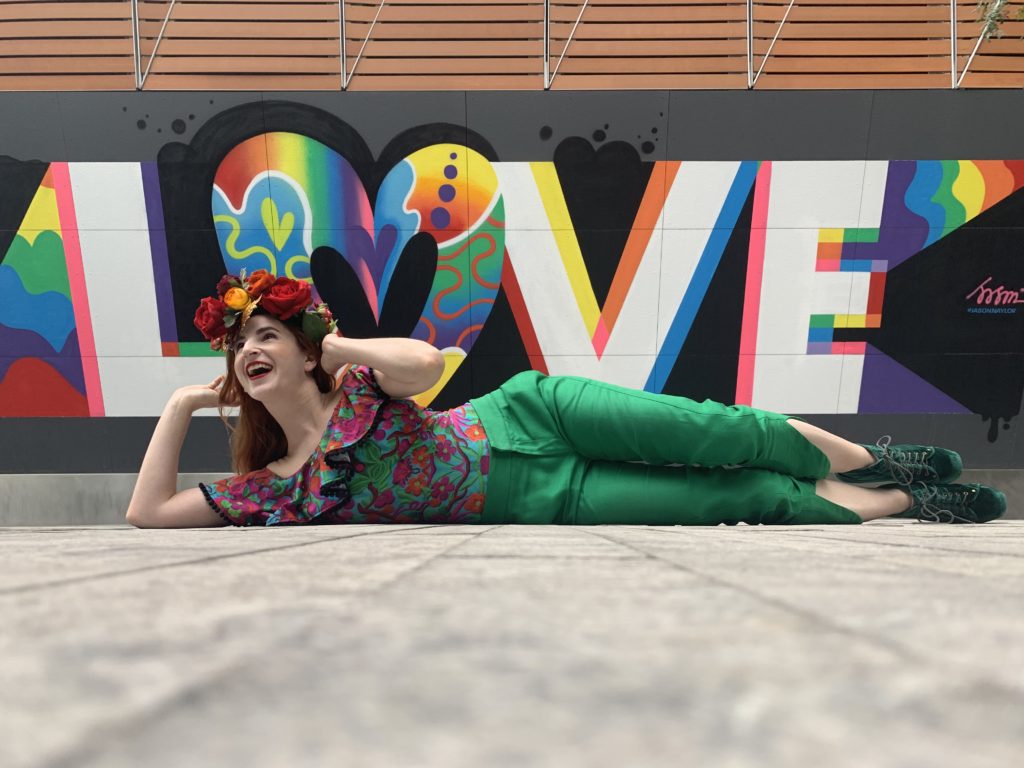
Every time I get notified of a new patron, I stop what I’m doing, wherever I am (literally: on the subway, in the hot tub, at the podcast conference) and do an elaborate Happy Dance that lasts for a solid 15 seconds at least, long enough for me to bypass any bit of embarrassment and to viscerally feel the joy rush through my body.
And I’m now making a Happy Dance video for each and every new patron!
So for access to The Full Horizontal, including this week’s episode with Dr. Alexandra Solomon, the secret patrons FB group, and for your very own Happy Dance video — become a patron of the horizontal arts.
Until next time: may you have someone to love, something to do, and something to look forward to. I’m looking forward to moderating the Q&A after Madison Young’s screening of her docu-series Submission Possible at the Museum of Sex!
I want you to know how much it does me good to know that you’re out there. Thank you for listening. And thank you for being the lifeblood of horizontal.
Come lie down with us again in Midtown Manhattan, New York, New York.
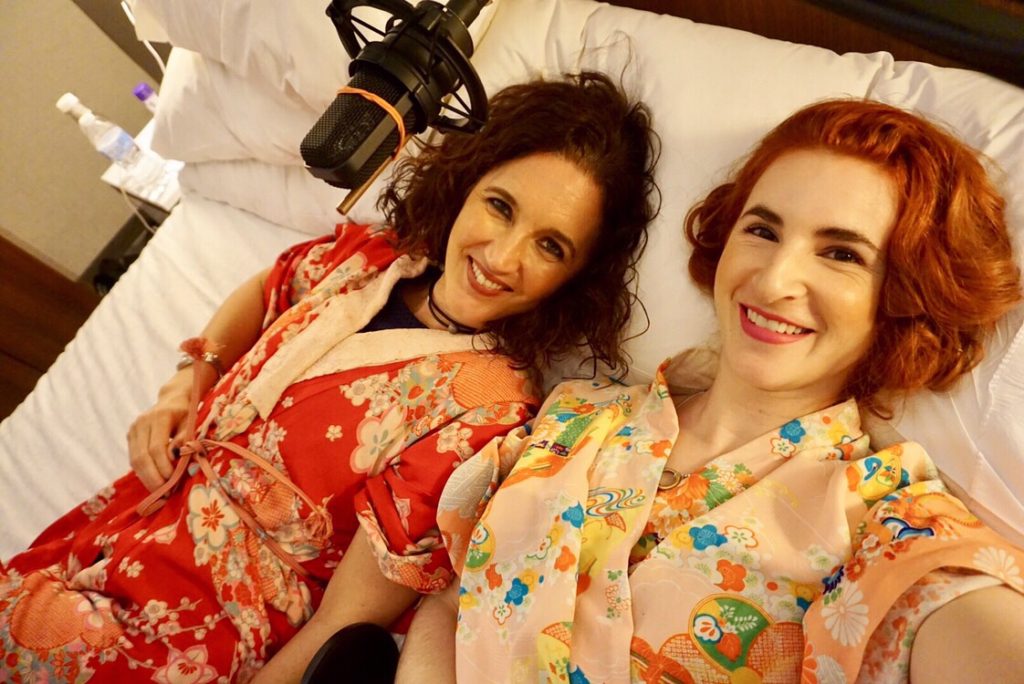
horizontal with Dr. Alexandra Solomon. A hotel in Midtown Manhattan. May 2019. New York, NY
Links to Things:
Alexandra’s website, dralexandrasolomon.com
Alexandra’s eponymous book Loving Bravely
Her forthcoming book, Taking Sexy Back
“The First Lesson of Marriage 101: There Are No Soul Mates,” the article about Alexandra’s Marriage 101 class in The Atlantic
Katya (Patrick’s ex)’s creation The Inheritance Project, performances about the things that we inherit from our family and culture
The Wikipedia on dialectic behavioral therapy
15. friend death, the quickie episode with Lila’s story about her former lover’s suicide
Show Notes:
(if you share, please link to the post or the Patreon!)
[5:02] In favor of marriage / a relationship of consistency
Lila: Would you say that you believe in marriage?
Alexandra: I do. I do! I really do. I have a really expansive definition of marriage, though.
Lila: I’d like to know it.
Alexandra: Well I— in that, I don’t give a crap what your marriage looks like, […] I support marriage with monogamy, with nonmonogamy, like, I don’t have a particular way that marriage needs to look, but I really do support, a container, like I love— I love that idea of people, a couple, creating a container that […] needs to constantly be expanded and reworked, but it creates that relationship of consistency. You know, there’s something about the […] consistency that makes is safe enough to take risks, that makes it safe enough to grow. […] There’s a lot of fear about marriage being boring, right, or there’s like a risk of staleness. And I think that can for sure happen, if couples aren’t committed to, a process of creation and re-creation.
[6:35] Alexandra on the three sexual entities in a couple’s relationship & how libido fluctuates
Lila: Has your desire for your husband fluctuated over the many years of your marriage?
Alexandra: Mmhm, definitely. Definitely, because desire, the desire is in: there’s his sexuality, there’s my sexuality, there’s our couple sexuality, right, there’s all— and each of those, is evolving and changing. And each of those, is shaped by the external variables. That’s so powerful to me, that just the external variables about, where I am in my journey as a mother — that’s a big piece of it. Stress— it’s just all the, the context of our lives, for sure, shapes. That sexuality, I think mine especially, even perhaps more so than his, is really really affected by the context.
[7:47] Alexandra on navigating uneven libidos
Alexandra: It’s impossible— I think it’s really unrealistic to think that both partners are gonna have the same libido, always at the same time—
Lila: Of course, it doesn’t seem possible.
Alexandra: No, and then what we— but the problem happens when we fill in the discrepancy with a story. A story of You’re bad or wrong ‘cause you want it too much. Or You’re bad or wrong ‘cause you don’t want it enough. […] That’s where problems happen, is where we import a story about what that discrepancy means, and make a value judgement about it, versus just describing it.
Lila: But even if there’s not the judgement— if your partner has less desire for you, there’s probably going to be a lot of pain, even if you’re not judging them or making them bad, or wrong for it.
Alexandra: […] The one who’s experiencing lower desire; I think it’s really important to unpack what helps them feel— what helps them enter an erotic space. […] What’s getting in the way? And keep it framed as a couple problem— that’s the really important piece.
[10:30] The sense that you somehow need to “earn your pleasure” by getting your To Do list done, contrasted with Mama Gena’s concept of pleasure as your birthright
[12:16] When was Alexandra able to reconcile being a smart woman & also a sexy one?
[13:32] The faculty Greek chorus of judges in Alexandra’s head
[13:55] On her new book, Taking Sexy Back, a close, quiet, compassionate, feminine journey into self, and growing into the identity of such a person who would write such a book
[17:19] Lila on the judgement leveled against women who write about sex
[17:45] How Lila learned to use her sexuality
Lila: From a young age, I realized that my flirtatiousness, and my sexuality had some power. I could use that, but almost like I had to use it like dark magic a little bit. Because people wouldn’t just want me to be their girlfriend because I’m great… That I had to ensnare, charm, bewitch… people with my sexuality.
[18:47] The man who dated my friend Jillian and I, and broke up with each of us, citing our Achilles heels— exactly where it hurts most
[19:38] Jillian’s journey to reconciling being “the smart one” with her sexuality
[20:34] Who gets to declare whether you’re sexy?
[20:08] Using sexy as a noun in her book, e.g. your sexy
[22:13] Lila on doing mirror-work (mirror mirror)
Lila: Have you done any — for lack of a better term — mirror work?
Alexandra: Mnnnn. What do you mean? Say more.
Lila: For some years, I have— because I, I grew up with the story that I was ugly. And the pretty girls were: blond-haired, blue-eyed, didn’t have big noses, and, were not me. Were different from me. And that I was never gonna be like, that. And, I really felt ugly, for a very very long time. And as I started to make some shifts in college — and after college — I would spend time— because I had spent a lot of time gazing at my nose in the mirror with great disgust. […] I remember being in middle school, being in the lunchroom bathroom, looking at myself in, in ¾ profile, and wondering, just how much blood would come out if I tried to scrape the bump off my nose.
Alexandra: (empathetically) Ohhh.
Lila: Or like what utensil—
Alexandra: Yeah.
Lila: What tool I could use. To, to cut, like, did I really need plastic surgery? I could just cut that off, you know? Fast forward to— I think it was really after college, when I— maybe even around the time that I became a yoga teacher. When I started looking in the mirror at my naked body, and looking for what was right. And starting to— I’ve always done a lot of self-soothing, with my hands. I stroke my inner arm, I, I fix my cuticles, I touch my face, I touch my lips, I touch my clavicle. I touch any kind of j— I usually wear very tactile jewelry, like I’m wearing right now, this long chain with a spike on it. I touch this; I run the spike along my fingers. I do a lot of sensory… play with myself, and and, only recognized it when I was in Codependents Anonymous as self-soothing, but that is definitely what it is. And so I started to… consciously caress myself, in the mirror— particularly I would often focus on my breasts— and I would, touch my breasts— because I knew that they were beautiful. […] So I would caress my breasts, and look at them— look at them in profile, and pose for myself, not taking pictures but, but, create shapes that looked beautiful and sensual and attractive to me… and essentially I would, I would dance with myself, and dance with my image, in a way that I had previously….. decimated my image, almost.
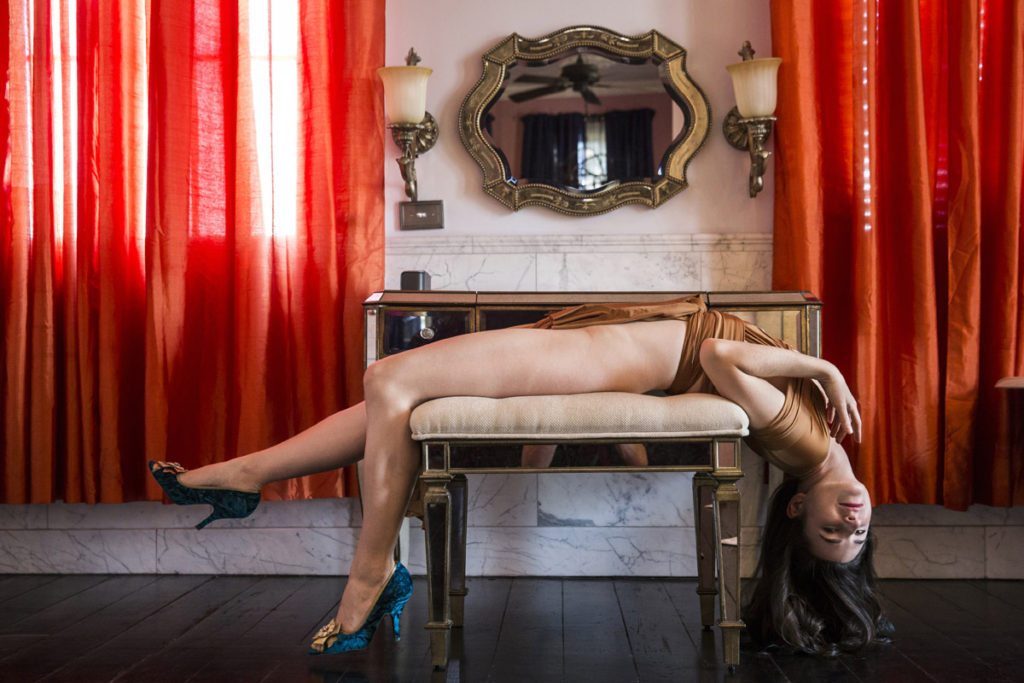
horizontal at the Hacienda Maison (a time that I did caress myself and pose for a camera), the Hacienda retreat space in NOLA. Image by Natan.
[20:35] The importance of dance in Alexandra’s life, and the idea of dancing yourself into your sexy
[28:27] Lila on her experience as a sex doll
[32:33] A conversation about coming inside me, primal desires, and feeling like one’s sexuality is a burden
[36:01] Alexandra on miscommunication
Alexandra: In an intimate relationship, we are so at risk of projecting our shit onto our partner, and then literally, hearing them say things they aren’t saying, because we’ve projected our own shame or fear onto them! And it happens so quickly. And it’s why those skills of, “Can you tell me more about what you mean by that?” Or […] “The story I’m starting to tell myself—“ Those words are so vital— “The story I’m telling myself is that…”
[36:51] Alexandra on not telling her husband what he means, his nearly-infinite patience, and what it means when he speaks in his lawyer voice
[37:58] Why don’t more monogamous people have explicit agreements about what monogamy means to them?
[39:06] The monogamous normativity of marriage & family therapy
[39:19] Alexandra on monogamy as a massive assumption
Alexandra: A monogamy is a massive assumption, and it has been— I was going to say implicitly, but I think it’s also explicitly held up as the gold standard, the best way, the only way, and that… nonmonogamy is inferior, less than, less mature […]
Lila: The standard narratives.
Alexandra: And so it was maybe like five years ago, I’m teaching my grad students, and a student’s hand goes up, and he’s like, “How does this apply to consensually nonmonogamous couples?” (laughing) And I was just like— it was like that record-scratch, like rrrrrRREE! (Alexandra & Lila make a record scratch noise) […] So that was my, okay, I will expand into that space, like, bring it on, so I in the last five years, have been— and I think our field in the last five year— I’ve seen a big, just influx of these conversations, and what I love, what I love about it— well I love a lot about it, but what I really love is that it, it invites people for whom the practice of monogamy makes sense, and feels aligned… the presence of the option of nonmonogamy invites people to make explicit their monogamy.
Lila: Yes.
Alexandra: And to talk about it. And to say, Why are we choosing it, and what are the consequences of choosing it? And how are we going to practice it? And like you’re saying, Where are the boundaries and What’s in and what’s out and Why is that out for you and in for me? And I think just opening up those conversations which don’t really have right or wrong, but help couples get, get clear on how to not hurt each other, and the conversations also […] it’s a chance to share more about where— where one’s sexuality extends into. Even just in fantasy, right? […] Even if we are going to keep, keep within this—
Lila: Keep this boundary, yeah.
Alexandra: Yeah. Then it just is— there’s more conversation. I think that’s really good for couples.
[41:50] Alexandra’s students, being almost all graduating seniors, are in a unique position of considering nonmonogamy from a pragmatic, rather than an identity perspective
[43:39] Franklin Veaux’s map of nonmonogamy
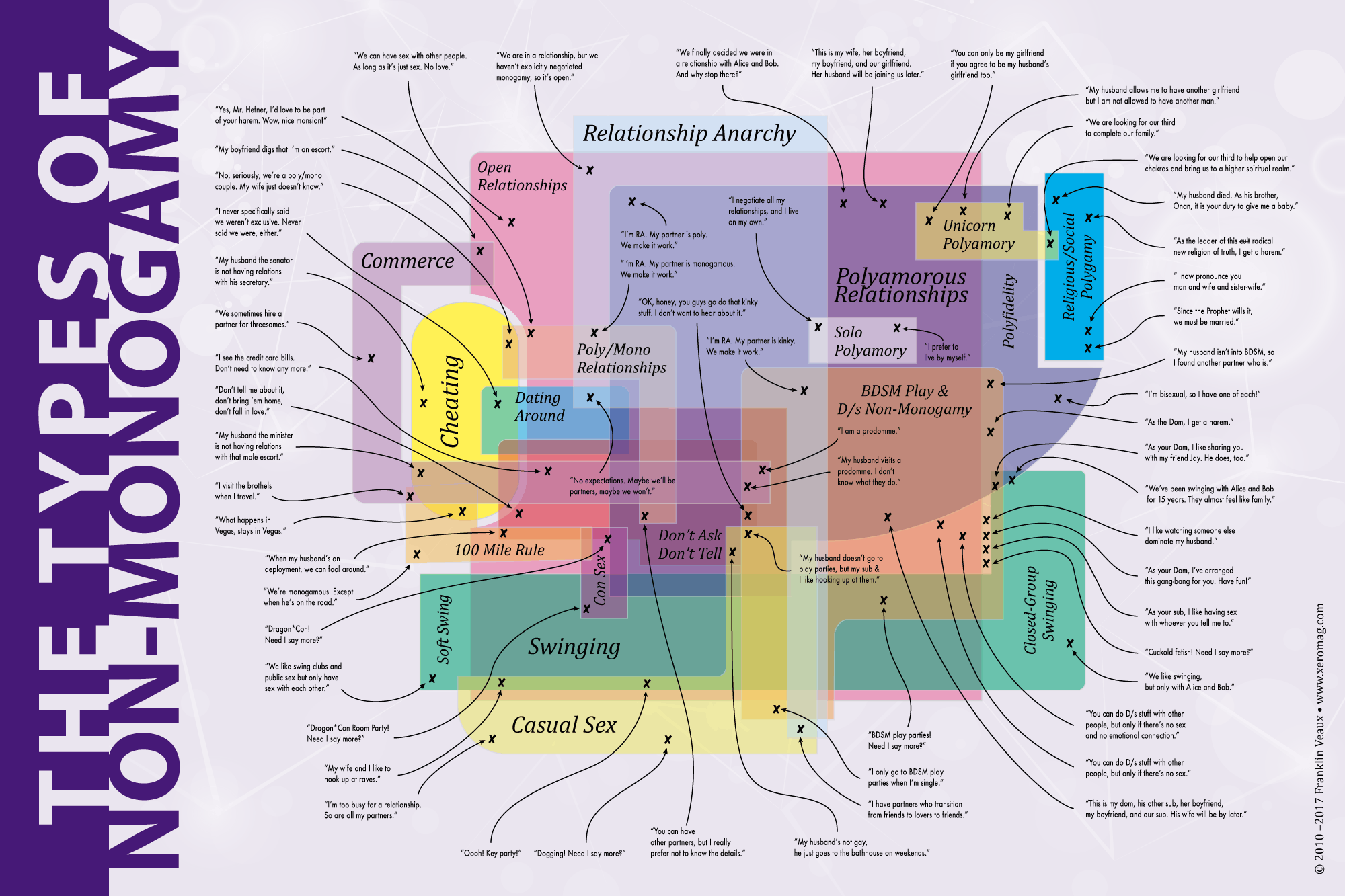
[44:56] What keeps her college students from defining their relationships
Alexandra: What I see a lot with my college students especially is these friends with benefits relationships—
friends with benefits (noun) = an arrangement (often implicit) in which friends sometimes have sex or to some degree “fool around,” typically without romance, declarations of love, or a DTR (define the relationship).
— or what they call at Northwestern, “exclusive,” like, sort of, we’re not defining the relationship, but on Saturday nights, I super-duper, am trying to figure out where you’re gonna be, and put myself there, in the hopes that we can hook up, like a lot of—
Lila: They call that exclusive?
Alexandra: Uhhuh. Uhhuh.
Lila: They’re only hooking up with each other?
Alexandra: Um, yes, or they call it “a thing,” like, we’re, “we’re a thing.”
Lila: “We’re a thing,” yeah.
Alexandra: But in a thing, you can’t really say, “I like you,” and you can’t really say, “What are we doing here,” like there’s just a lot of expectation of kind of just being—
Lila: Yeah! It’s predicated on not talking about it!
Alexandra: Right. […] And the sort of gendered piece— well, it’s gendered in two different ways: what I hear male students say is, “I can’t talk about it because I’m afraid she wants more than I can give” —
Lila: Yes.
Alexandra: Which, oftentimes, he’s totally inaccurate about, because she’s like, “No seriously, I don’t want more either!” But he carries a story that, If we’re gonna talk about this, what’s gonna happen is, I’m gonna find out that I’m, not measuring up to your expectations. And then for her, her silence, is around a fear of being perceived as kind of controlling, too much—
Lila: Right. Not being “the cool girl.”
Alexandra: Not being the cool girl, being too feminine, like the sort of, feminine needy. So that silences her.
Lila: The longing— in this case the longing is the burden, right. […] I feel really sad for them.
[46:31] Lila wishes that every high school would have Marriage 101 classes
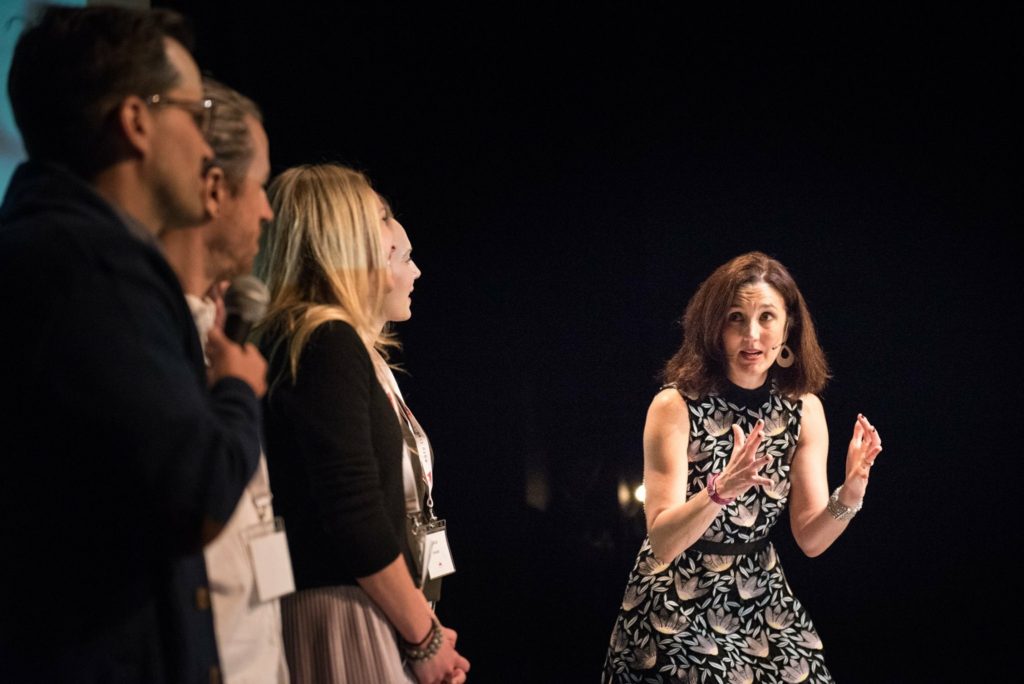
Don’t you wish she were your professor?!
[47:18] Marriage 101 is unique because it’s a relationship-education class that’s focused on self-awareness
[48:22] Why the experiential relationship learning is important
Alexandra: When the learning is […] removed from you, what you end up learning is that there’s a right way and a wrong way— versus when the learning, when you build curriculum around just— helping people be really close to … what they’ve inherited, and what they want to keep enacting— […] that’s just so much more permission-giving, and it creates more authenticity, and it helps people be brave enough to have the conversations about … Okay I really like you, and I really want more time with you or I really want to see you on a Wednesday, rather than just waiting ‘til the weekend. That’s the thing my students come away with, more than anything else is just feeling better able to say what they want!
[49:02] This line of self-inquiry is similar to Lila’s empathy question: Is this mine? Is this somebody else’s?
[49:18] We could do this with our sexuality & relationship styles
Lila: I wish for us all to do that with our assumptions, constrictions, judgments, and ideas— about relationships: Is this mine? Or is this somebody else’s?
[49:35] Inheriting relationship norms from our parents
[50:00] How much we want to be what our parents want us to be. Alexandra sees this particularly expressed in first-generation college students, and first-generation Americans
Alexandra: I mean, some of it’s about, needing to belong, right, […] fear of being rejected if I’m not who you need me to be or want me to be… but then some of it’s also driven so much by love and oftentimes I see this with my students who are either first-generation college students, or first-generation American, […] where they carry their parent’s story of struggle, like really authentically carry—
Lila: On them as a backpack, basically.
Alexandra: Yeah! In a beautiful sense of like, I’m here because of what my parents did. I have these opportunities my parents didn’t have. And where it really is a desire to bring full circle their parents story of struggle, and, and also needing to write— sort of like let, let some of it go, like finding that line between burden and honor.
[50:50] Patrick’s ex, Katya, and her creation The Inheritance Project, performances about the things that we inherit from our family and culture
[52:09] Alexandra’s mentor, Mona on child/parent understanding
Alexandra: I have a mentor, Mona, who wrote the forward to Loving Bravely, she describes it as, “When we do our emotional processing, we are able to see our parents as our grandparents kids.”
Lila: Mmmmmmm.
Alexandra: Right, and when you see your parents as your grandparent’s kids, you can see the backpacks that they carried. They brought those backpacks in, and they had their stuff, and they transformed some of it in having you, but they sure didn’t transform all of it. And so, I think that’s an opener to compassion that’s not like, doormat compassion, that’s you can walk all over me because you suffered, but compassion of: I can be different from you; I can say no to you, and I can see that you are complicated because you’ve had your own journey of struggle.
[52:55] Amy Poehler’s mantra in her memoir Yes Please: “Good for her, not for me”
Lila: She’s wanting us to dismantle this legacy of competitiveness amongst women, that you know, if you are beautiful and smart and charismatic and stylish, that somehow I can’t be those things. If you’re in my presence. Which is obviously not true, and yet ingrained in our… maybe primal competitiveness […] for mates. So I was thinking as you were saying that: “Good for my parents. That’s not for me.”
[53:46] Lila’s realization that she wants to have her wedding before her parents die
[54:43] Her both and: both rebellious and longing to dance with her father at her wedding
[55:43] What Alexandra’s brothers said they would miss the most after their Dad passed away
[56:42] The ability to hold seemingly opposite truths and dialectic behavior therapy
[57:47] We could call that ability dialectical intelligence
[59:16] Lila’s former lover Michael, and his lifeskill of assuming the most generous interpretation of events
[59:43] Lila on learning to tell ourselves better stories
Lila: If we’re gonna tell ourselves stories, and we do, better that we use our imagination for good rather than evil. If we’re worrying, we’re kind of using our imagination for evil. It’s a misuse of our imagination. Might as well create a story of goodwill.
[1:00:17] Alexandra tells me a story, including a very important letter, about her father’s death, and the gift of his body to science
[1:09:50] Lila tells of the night before this recording, when Patrick listened to 15. friend death, the quickie episode of Lila’s story about her former lover’s suicide
[1:13:12] The story of Alexandra’s mother-in-law, the wailing wall next to the Solomon quote, The Grief Girls Group, and the two Kens
[1:16:31] Lila on not being accustomed to being adored
[1:18:36] Suzi Winson (of the Circus Warehouse) and her advice to Lila
To listen to this episode, click the saucy redhead on the peach background, and become a patron of the horizontal arts…

